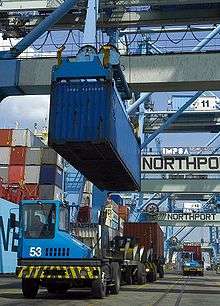Deglobalization
Deglobalization or Deglobalisation is the process of diminishing interdependence and integration between certain units around the world, typically nation-states. It is widely used to describe the periods of history when economic trade and investment between countries decline. It stands in contrast to globalization, in which units become increasingly integrated over time, and generally spans the time between periods of globalization.
The term of deglobalization has derived from some of the very profound change in many developed nations, where trade as a proportion of total economic activity went down between 1914 and 1970s. This decline refers that their economies become less integrated with the rest of the world economies in spite of the deepening scope of economic globalization.[1]
While as with globalization, it can refer to economic, trade, social, technological, cultural and political dimensions, much of the work that has been conducted in the study of deglobalization refers to the field of international economics.
Periods of deglobalization are seen as interesting comparators to other periods, such as 1850–1914 and 1950–2007, in which globalization had been the norm, given that globalization is the norm for most people and thus even periods of stagnant international interaction are often seen as periods of deglobalization. The globalization index of KOF Swiss Economic Institute shows a clear break for economic globalization in 2009: " The bursting of the dot com bubble and the events of 9/11 merely slowed down the pace of globalization; the latest economic and financial crisis has, however, created a severe setback for the globalization process"[2] In 2010, the standstill in the globalization process basically continued but with different regional patterns: "The biggest upward movement as a region occurred in South Asia (albeit a very minor increase) while Latin America and Sub Saharan Africa saw a very minor decrease in their regional average. High income countries and in particular OECD countries continue their trend of stagnation which has started even before the current crisis."[3]
Measures of deglobalization
As with globalization, economic deglobalization can be measured in different ways. These centre around the four main economic flows:
- Goods and services, e.g. exports plus imports as a proportion of national income or per head of population.
- Labour/people, e.g. net migration rates; inward or outward migration flows, weighted by population (and resultant remittances in per cent of GDP)
- Capital, e.g. inward or outward direct investment as a proportion of national income or per head of population
It is generally not thought possible to measure deglobalization through lack of flows of technology, the fourth main flow. Those areas that are measurable do suggest other possible measures, including:
- Average tariffs
- Border restrictions on labour
- Restrictions on foreign direct investment or outward direct investment
One of the prominent examples of deglobalization movement could be found in the United States of America, where the Bush and Obama administration instituted Buy American Act clause as party of massive stimulus package, which was designed to favor American-made goods over traded goods. Likewise, the EU has imposed new subsidies to protect their agricultural sectors for their own protection. These movements of deglobalization are can be seen as the example of how developed nations react to the Financial crisis of 2007–08 through deglobalization movements.[4]
Risks of deglobalization
Typically a reduction of the level of international integration of economies (and the world economy at large) are expected to exert second round effects related to four feedback mechanisms:[5]
- a reduction of (the rate of growth) of international trade will feed negatively into to long-run growth
- a loss of interaction, the co-movement of economies,
- trade policy feedbacks in the sense that reduced international interaction and lower growth will stimulate protectionism and non-economic issue areas where reduced cooperation among countries and even an increasing risk of international conflict can be expected.[6]
International political economy of deglobalization
Deglobalization has also been used as a political agenda item or a term in framing the debate on a new World economic order, for example by Walden Bello in his 2005 book Deglobalization.[7]
References
- ↑ New York University Department of Sociology (2013). The Sociology Project. United States of America: Pearson. p. 569. ISBN 978-0-205-09382-3.
- ↑ KOF. "Press release March 16, 2012" (PDF). Archived from the original (PDF) on June 2, 2013.
- ↑ KOF. "Press release March 1, 2013" (PDF).
- ↑ Office of the Law Revision Counsel. US House of Representatives https://web.archive.org/web/20120806135758/http://uscode.house.gov/uscode-cgi/fastweb.exe?getdoc+uscview+t41t42+22+1++(41)%20%20AND%2. Archived from the original on 2012-08-06. Retrieved 2013-01-02. Missing or empty
|title=(help) - ↑ Peter A.G. van Bergeijk, On the brink of Deglobalization, (Edward Elgar, 2010), ISBN 9781849804110
- ↑ Peter A.G. van Bergeijk, "Some economic historic perspectives on the 2009 world trade collapse," International Institute of Social Studies (ISS), Working Papaer 476 (The Hague, 2009).
- ↑ Walden Bello, Deglobalization: Ideas for a New World Economy, (Zed books, 2005). ISBN 9781842775455
